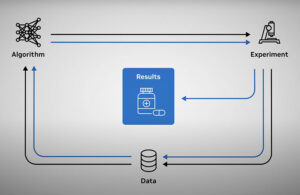
[NVIDIA]
It turns out that a cell is itself like a computational device with circuits and code, Regev said. These molecular “circuits” interact with each other, receive information, make decisions, and execute them. “These molecular circuits — they’re hard to reverse engineer,” she said. That hasn’t stopped scientists from spending decades trying to model and predict their behavior. “Mostly unsuccessfully, I can tell you,” Regev added.
But what if we could harness the same technological power driving those other breakthroughs to unravel this biological mystery? This is precisely Genentech’s goal with its ‘lab in the loop’ approach.
The power of quantity in unlocking cellular biology’s secrets

Aviv Regev, Ph.D.
The core of Genentech’s Lab-in-the-Loop approach is to reimagine the study of biological systems. Traditionally, scientists focused intensely on individual cells or small groups. While valuable, this left us with a fragmented understanding of the immense complexity within our bodies. “If we want to understand and treat a disease, we need to know our cells. We need to know how they work, how they break down, and how to fix them with medicines,” Regev said.
The problem, as Regev puts it, is scale. Humans are composed of tens of trillions of cells. With thousands of different cell types and states, and about 20,000 genes, there are mind-boggling possible genomic combinations.
Machine learning is helping tackle the scale problem. Now, instead of intensely focusing on a few cells, researchers can generate unravel new patterns by analyzing lower-resolution data on millions of individual cells. “It’s better to look at very noisy and very partial measurements for tens of thousands or millions of individual cells” than it is to focus on a single, thoroughly measured cell, she said. “Quantity will become quality.”
New technologies are helping address the problem of scale. Consider tools like droplet-sequencing (Drop-seq) microfluidics that can profile vast numbers of cells. Or think about the ramifications of the global research initiative the Human Cell Atlas, which aims to map every cell type in the human body. A community of researchers contributing to the project have profiled tens of millions of cells from almost 10,000 individuals. Additionally, single-cell sequencing technology has also enabled researchers to uncover previously unknown cell types, such as ionocytes in the lungs, which are involved in cystic fibrosis.
Making drug discovery more predictive
Similarly, Genentech’s Lab-in-the-Loop aims to evolve experimental and clinical data into computational models that generate predictions about potential drug candidates — how cells will respond to various interventions. The loop in the name refers to a continuous learning cycle that occurs when the AI-generated predictions are tested in real-world lab experiments. The results of these experiments then flow back into the models, making them smarter and more predictive. “We can start with an experiment, collect data, train a model on the data, and then use the model to predict the next set of experiments and iterate,” Regev said. “That sounds very simple, as long as you can do it at scale.”
The Lab-in-the-Loop approach is already beating human specialists at specific tasks. Using high-throughput data, one model was about 54-fold better compared to the original approach, which relied on expert medicinal chemists to select the most promising molecules to synthesize, Regev said. “It also recommended new platforms that were not imagined by the experts.”
AI outperforming human experts in defined tasks
Another Genentech model, designed to mimic evolutionary principles for therapeutic antibody creation, also consistently outperforms human engineers. “Our model, which we call Deep Fitness, discovers molecules that have one to two orders of magnitude better affinity than what the experts did,” Regev said. “And when our human experts first saw the results, they said, ‘Oh, I would have never picked those.'” The point is not to replicate human experts. “They need something that’s different from them,” Regev said.
Genentech’s Lab-in-the-Loop approach can uncover new drug targets, optimize interventions, and personalize treatment strategies. The approach has already produced tangible results, providing insights into the development of the antibody candidate vixarelimab for interstitial lung disease and inflammatory bowel disease. In oncology, AI-powered analysis of tumor DNA played a role in the development of a personalized neoantigen vaccine candidate known as iNeST, developed in collaboration with BioNTech.
Genentech lab in the loop focuses on growing data possibilities
As datasets continue to grow, Genentech’s Lab-in-the-Loop approach aims to expand its reach across more therapeutic areas. Another promising technology is the emergence of multimodal models that unite unique data assets. “Our present team now builds large multimodal foundation models that use all our data, especially our proprietary data,” Regev said. “The models are designed for both general-purpose tasks like representation learning or knowledge-grounded chat, but also tasks that are specific for lab and clinical AI — foundation models, agents.”
Genentech’s partnership with NVIDIA aims to accelerate each and every one of the Lab-in-the-Loop approach’s components, recognizing that drug discovery and development only works when all the elements are working together.
Regev highlighted that the main focus of using AI in drug discovery isn’t about abstract computing power, but about improving patients’ lives. “Our work relies on everybody — the lab, the clinic, the algorithms, the data, the models are only as good as the data we train them on, the questions we pose to them, and the actions we take” she said. “We owe it to each and every one of our patients to be the absolute best.”
Filed Under: Drug Discovery and Development, machine learning and AI, Oncology, Rare disease



